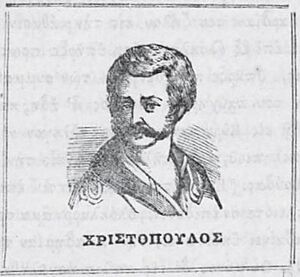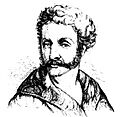Athanasios Christopoulos facts for kids
Athanasios Christopoulos (Greek: Αθανάσιος Χριστόπουλος; May 2, 1772 – January 19, 1847) was an important Greek poet, writer, and lawyer. He is known for supporting the modern Greek language spoken by everyday people. Many see him as a pioneer for Greece's national poet, Dionysios Solomos. Christopoulos was also the first modern Greek poet whose works, especially his collection called Lyrika, were published and read widely across Europe.
Contents
Life of Athanasios Christopoulos
Early Life and Education
Athanasios Christopoulos was born in Kastoria, a city in Macedonia. His father was a Greek Orthodox priest. In 1774, his family moved to Bucharest, which was then part of Wallachia.
Athanasios learned a lot from respected Greek teachers. He studied ancient Greek literature and religious texts. He admired the poet Vitsentzos Kornaros and his work Erotokritos, which later inspired Christopoulos's own writing. He also loved the folk songs of his homeland. The leaders of Wallachia, like Alexander Ypsilantis (1725-1805), encouraged learning and culture, which helped Christopoulos grow.
In 1792, Christopoulos started studying medicine at the University of Pest. He learned Latin, which was common for universities back then. After two years, he realized he was more interested in law. In 1794, he visited Italy and decided to study both medicine and law at the University of Padua.
Career and Writings
By 1797, Christopoulos returned to Bucharest. He decided not to pursue medicine. Instead, he taught children from wealthy Greek families, known as the Phanariot Greeks. In 1799, he became a tutor for the children of Alexander Mourouzis, who was the Prince of Wallachia.
Prince Mourouzis loved education and the arts. He had even set up many libraries. With Mourouzis's support, Christopoulos began translating Homer's Iliad into the common Greek language by 1803. In 1804, he wrote a play called Achilles, also in the everyday Greek language.
Revolution in Greek Language
In 1805, Christopoulos wrote a very important book called "The Aeolo-Doric Grammar." This book changed how people thought about Greek language and literature. He argued that no one had created a proper grammar for the Greek people living under Turkish rule. He believed this was because many Greek scholars cared more about ancient Greek than about the language needs of ordinary people.
This book caused a big debate. One of his main critics was Adamantios Korais, a famous scholar who wanted a "purified" Greek language (called Katharevousa). Christopoulos argued that the true national language of Greeks should be the dialect spoken by common people and found in folk traditions, not Korais's idea. He even said that the Aeolo-Doric dialect, spoken in Macedonia, Epirus, and Thessaly, was the real basis of modern Greek, not the ancient Attic dialect of Athens. He urged Greeks to honor their spoken language.
Poetry and Recognition
In 1806, Prince Mourouzis moved to Constantinople. Christopoulos went with him and was given an important job collecting taxes. He also gained access to Mourouzis's amazing personal library. During these years, Christopoulos's many poems were collected and published.
In 1811, his collection of poems, Lyrika, was published in Vienna and became very popular. These poems were read across Europe, especially in Germany, France, and Italy. People called him the New Anacreon, comparing him to an ancient Greek poet famous for love and drinking songs.
Later Life and Public Service
After Prince Mourouzis lost power in 1811, Christopoulos went back home. Luckily, the new ruler, John Caradja, liked Christopoulos and invited him to his court. Recognizing Christopoulos's legal background, Caradja made him the Logothete of Foreign Affairs. This was not just an honorary title; Christopoulos was asked to write a new set of laws for Wallachia.
By 1818, the Wallachian Code of Law was created. Its goal was to improve the lives of ordinary people. However, the wealthy nobles opposed it because it challenged their old feudal rights. The Code showed influences from French legal ideas, similar to the famous Napoleonic Code.
Personal Challenges and Travel
Around 1817, Christopoulos married a younger woman whose name is not known. They had a son named Ioannis. His wife was not very interested in his work and preferred social gatherings. The marriage faced difficulties. Also, the new law code led to protests against Caradja, who was eventually removed from power. Christopoulos, feeling disappointed, decided to go with the prince to Italy, taking his infant son and a wet nurse. His wife did not join them.
In 1819, Christopoulos lived in Pisa, Italy. Here, he likely met famous Romantic writers like Lord Byron and Percy Bysshe Shelley. Later that year, he traveled to the Greek island of Zakynthos (also called Zante). He met many important writers there, though it's not confirmed if he met Dionysios Solomos, who would become Greece's national poet.
Christopoulos also visited Ioannina, a city ruled by Ali Pasha of Ioannina, and spent time with poets like Athanasios Psalidas. By the end of the year, he went to Corfu, where he probably joined the secret patriotic group called the Philike Hetaireia (Society of Friends). He also secretly exchanged letters with Alexander Ypsilantis, who would soon declare the Greek War of Independence in 1821.
In 1823, British authorities found his letters with Ypsilantis. Fearing arrest, Christopoulos quickly left Corfu and went to the quiet Transylvanian Alps.
Return Home and Final Years
When he returned to Wallachia, Christopoulos settled in the village of Sibiu. His son and wife, who had changed her mind, joined him there. He learned about the Greek War of Independence and the harsh actions taken by the Turks against Greek communities.
Christopoulos felt tired spiritually and artistically. He decided to live a private life and focus on promoting the demotic (common) form of the Greek language through his literature. He also wrote a book called Political Parallels, which analyzed different political systems. He argued that any political system needs good leaders to succeed. He believed that focusing only on self-interest or using state violence was harmful.
In 1836, Christopoulos heard a strange rumor from friends in Greece that he had died. He decided to travel to Piraeus, Greece, to prove he was alive. Many people, including poets like Alexandros Soutsos, welcomed him with cheers. He visited Athens, the capital, and enjoyed seeing ancient sites like the Acropolis.
However, he was also very disappointed by what he saw in Greece. There was poverty, disorganization, corruption, and violence. He learned that journalists were on trial, and famous war heroes were disliked by the royal court. Thieves were active, and the king's Bavarian soldiers were causing trouble. The young king seemed more interested in finding a queen than in governing well. Even his friends seemed distant. This disappointment was unexpected, so he cut his trip short and returned home.
Christopoulos spent his last years working for the new ruler, Alexandru II Ghica, and organizing his literary works. He passed away peacefully at home with his family on January 19, 1847.
His book Hellenika Archaiologemata (published in Athens, 1853) tells the story of his life. Later, in 1931-1932, a poet named Thomas K. Papathomas published Christopoulos's "Complete Works" in Thessaloniki.
Works by Athanasios Christopoulos
- ΑΘΑΝΑΣΙΟΥ ΧΡΙΣΤΟΠΟΛΟΥ ΓΡΑΜΜΑΤΙΚΕ. ΤΗΣ ΑΙΟΛΟΔΟΡΙΚΕΣ ΗΤΟΙ ΤΗΣ ΟΜΙΛΟΥΜΕΝΗΣ ΤΩΡΙΝΗΣ ΤΩΝ ΕΛΛΗΝΩΝ ΓΛΟΣΣΑΣ. Vienna, 1805 (google)
- ΑΘΑΝΑΣΙΟΥ ΧΡΙΣΤΟΠΟΛΟΥ ΛΥΡΙΚΑ ΕΡΩΤΙΚΑ ΚΑΙ ΒΑΚΧΙΚΑ. Β' Ἔχδοσις τοῦ Ἐθνικοῦ Ἡμερολογίου. Paris, 1864 (google)
- Collection de monuments pour servir a l'étude de la lengue néo-hellénique. N° 11. Le premier chant de l'Iliade traduit en vers grecs vulgaires par Ath. Khristopoulos. – IΛIΑΔΟΣ ΡΑΨΩΔΙΑ Α. Μεταφρασθεῖσα εἰς δημοτικοὺς στίχους ὙΠΟ ΑΘΑΝΑΣΙΟΥ ΧΡΙΣΤΟΠΟΥΛΟΥ ΕΚΔΙΔΟΝΤΟΣ ΑΙΜΥΛΙΟΥ ΛΕΓΡΑΝΔΙΟΥ. Paris, 1870 (google)
- Poésies lyriques de l'Anacréon moderne, Athanase Christopoulos, publiées et corrigées par G. Théocharopoulos, de patras. Avec la traduction française en regard. Strasbourg (google)
Images for kids
-
A statue in Kastoria
See also
- List of Macedonians (Greek)
 | Janet Taylor Pickett |
 | Synthia Saint James |
 | Howardena Pindell |
 | Faith Ringgold |




